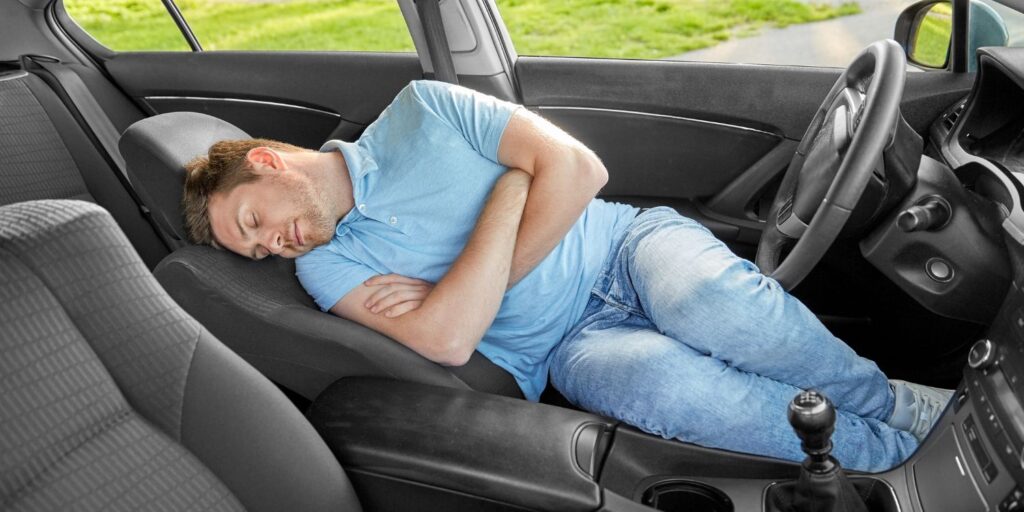Sleeping in your car can be a practical solution during road trips or on a budget. However, knowing where to park and sleep in your car legally is crucial to avoid legal issues.
Understanding the rules and regulations regarding sleeping in your car can help you plan your travels more effectively and ensure a safe and comfortable experience.
In this article, I will give detailed information on where you can legally sleep in your car, including rest areas, campgrounds, and other designated areas.
Where Can I Legally Sleep in My Car?
It’s important to know the laws and regulations regarding where you can legally sleep in your car to avoid any issues. Here’s a detailed 5 to help you understand where you can legally sleep in your car:
1: Check Local Laws
Before parking and sleeping in your car, research the laws and regulations in the area you plan to stay. Some cities and towns have ordinances that prohibit sleeping in vehicles, especially on public streets.
2: Use Designated Areas
Look for designated rest areas, welcome centres, or truck stops along highways where sleeping in your car is permitted. These areas often provide facilities like bathrooms and vending machines.

3: Consider Campgrounds
Campgrounds and RV parks are suitable places to sleep in your car, as they are designed for overnight stays. However, you may need to pay a fee for using these facilities.
4: National Forests and Grasslands
In many national forests and grasslands, you can park your car and sleep in it for free. Check with the specific forest or grassland for any restrictions or regulations.
5: Ask Permission for Private Property
If you plan to sleep in your car on private property, such as a friend’s driveway or a hotel parking lot, it’s essential to obtain permission from the property owner beforehand.
Learn more about How To Pick a Car Lock?
Why Is It Illegal To Sleep in Your Car in Some Places?
It is illegal to sleep in your car in some places due to various reasons. One primary concern is safety.
Authorities may worry about individuals sleeping in their cars, particularly in areas where there is a higher risk of crime or accidents.
Sleeping in cars can also lead to public nuisance issues, such as littering, noise disturbances, or the clustering of vehicles in public spaces. Additionally, health and sanitation concerns may arise, including waste disposal and hygiene.
Zoning regulations may also play a role, as some areas prohibit overnight parking or camping in vehicles to maintain the area’s character and quality.
Furthermore, laws prohibiting sleeping in cars can sometimes be aimed at addressing homelessness, although this is a complex issue with differing perspectives.
It’s crucial to understand and comply with the laws and regulations regarding sleeping in cars in each area to avoid legal complications.

Is it safe for drivers to sleep in their cars?
- Sleeping in a car can be safe if done in a suitable location, such as a designated rest area or campground.
- It is important to park in a well-lit, safe area to reduce the risk of theft or other incidents.
- Ensure the car is parked legally and does not obstruct traffic or violate any parking regulations.
- Avoid sleeping in areas with known safety issues or high crime rates.
- Use caution when sleeping in remote or isolated areas, as assistance may not be readily available in case of emergency.
- Consider using window shades or covers to maintain privacy and prevent unwanted attention.
- Keep doors locked and valuables out of sight to reduce the risk of theft.
- Always have a plan for emergencies and be aware of your surroundings.
What you need to know before Sleeping in a car
Before sleeping in a car, there are several important considerations to keep in mind:
Legalities
Research local laws and regulations regarding sleeping in vehicles. Some areas may have restrictions or prohibitions.
Safety
Choose a safe, well-lit location. Lock doors and keep valuables out of sight to reduce the risk of theft.
Comfort
Ensure your car is clean and organised. Use pillows, blankets, or sleeping bags for comfort.
Emergency Preparedness
Have a charged phone and know the location of emergency services. Keep a flashlight and first aid kit in your car.
Hygiene
Plan for restroom breaks. Keep wet wipes, hand sanitiser, and personal care items handy.
Conclusion
Sleeping in your car can be a practical solution in certain situations, but it’s important to consider the legalities, safety, comfort, emergency preparedness, and hygiene factors involved.
By researching local laws, choosing safe locations, ensuring comfort, being prepared for emergencies, and maintaining hygiene, you can make sleeping in your car a safer and more comfortable experience. Always prioritise safety and legality to avoid any issues.




